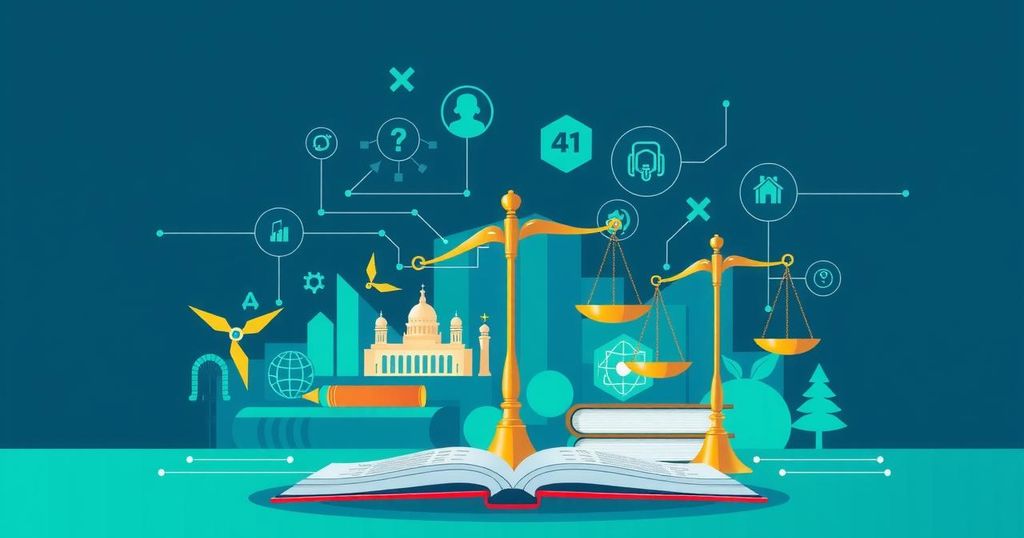Washington State Lawyers Show Limited AI Adoption Despite Growing Interest
A recent survey indicates that only 25% of Washington lawyers regularly use generative AI, revealing significant gaps in knowledge and cybersecurity practices. The WSBA’s findings highlight varying adoption rates across different practice areas, with in-house counsel leading in AI use. Concerns about training and ethical guidelines call for a tailored approach to education and technology resources as the legal landscape evolves.
In an eye-opening survey from the Washington State Bar Association (WSBA), a cautious attitude toward artificial intelligence (AI) is evident among lawyers. Conducted from September to October 2024, the results—revealed in April 2025—show only a quarter of Washington lawyers regularly using generative AI. Yet, a majority of respondents seem to lack basic tech know-how, which raises concerns across the legal framework in the state.
Interestingly, about 63% of the lawyers harness the free, public versions of AI just for basic tasks like legal research and drafting documents. It’s a choice that leads to security anxieties and professional compliance questions. The survey drew participation from 516 members, translating into a 5% response rate, providing a confidence level of 98% in its findings. Drastic differences in tech adoption were noted among different practice settings.
This survey emerged from WSBA’s Legal Technology Task Force, which was established last year to study how technology affects legal practices and consumer protections. The numbers indicate that while 25% of lawyers are on the AI train, others lag behind, especially in small to mid-sized firms, with just 22% in those settings using generative AI regularly.
The corporate world has evidently embraced AI more, with an impressive 70% adoption rate reported among in-house counsel, while family law and civil litigation attorneys trailed at a mere 16 to 22%. In the report’s words, “Survey responses reflect the varied nature of legal practices across Washington, from large in-house counsel teams to solo practitioners.”
There’s a notable gap when it comes to AI understanding, too. Only 9% of surveyed lawyers rated their AI knowledge as “good” or better, while a majority—69%—think they’ll need further training and skills development. This gap is mirrored in their cybersecurity practices, pointing to potentially dangerous holes in the state’s legal protocols.
Conversely, a contradictory scenario arose regarding cybersecurity confidence. While 79% of respondents were assured their firms could handle cybersecurity threats, the survey found concerning deficiencies. Merely 68% reported using multi-factor authentication, and alarmingly, only 34% said they conduct regular security audits; these critiqued as essential by various regulatory bodies.
Moreover, technologies like law practice management systems seem underused, especially in smaller practices—barriers include cost, lack of training, and a belief that the return on investment isn’t worth it. With regards to the ethical implications of AI, there is a clear divide of opinion. While half of the surveyed members believe tech-driven changes could enhance their legal experience, many are skeptical about AI’s overall benefits to the court system and legal profession.
Public access to AI for legal concerns gets mixed reviews too. On one hand, 36% are in favor of public use, arguing it could help fill gaps for those lacking adequate legal services—especially in rural areas. Opponents, however, cite accuracy issues and express concern over the general public’s lack of legal expertise.
As for ethics, only 23% felt that current ethics rules cover generative AI adequately, with growing calls for WSBA-led guidelines emerging, particularly from in-house counsel teams that are the most frequent AI users. Legal professionals in Washington are clearly voicing the need for a structured approach to training and resources, with 72% supporting a new technology-related continuing legal education (CLE) requirement.
In sum, the WSBA Technology Task Force has already identified key takeaways: improving technology understanding is crucial for effective client service. Diverse solutions to meet diverse needs must be considered, especially for smaller firms struggling with financial and resource constraints. The path moving forward will demand strong support structures as the legal landscape continues to evolve rapidly in response to technological advancements.
The survey from the Washington State Bar Association paints a complex picture of AI adoption among lawyers in the state. While there’s a cautious interest in the technology, significant gaps in knowledge and cybersecurity practices are evident. The findings underscore the importance of tailored educational resources and ethical guidelines as the legal sector navigates the evolving tech landscape. As AI begins to take a more prominent role in the legal profession, proactive steps are needed to address concerns and enable effective use of the technology while ensuring public trust.
Original Source: www.lawnext.com




